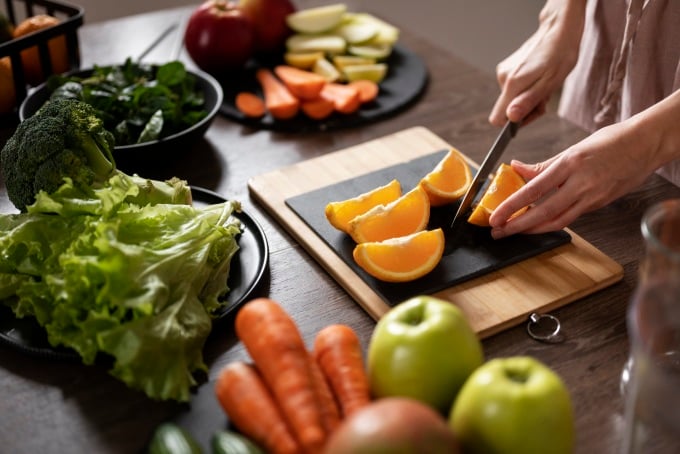Risk factors for breast cancer such as family history and gene mutations cannot be changed, but a healthy diet and not smoking can help prevent the disease.
Breast cancer is linked to a combination of genetics, lifestyle, and environmental factors, which can either increase or decrease the risk. Preventing breast cancer helps reduce the number of new cases. The American Cancer Society estimates that women who detect breast cancer early, when it is localized (no signs that the cancer has spread beyond the breast), have a 5-year survival rate of up to 99%. Early detection includes monthly breast self-examinations, clinical breast examinations, and mammograms as directed by a doctor.
According to Dr. Nguyen Do Thuy Giang (Head of Breast Surgery Department, Tam Anh General Hospital, Ho Chi Minh City), some risk factors such as a family history of breast cancer or carrying gene mutations are unchangeable. However, women can change their lifestyle with healthy habits and maintain physical activity to prevent breast cancer early.
Maintain a healthy weight and avoid obesity: If your weight is appropriate for your height, try to maintain it. If you need to lose weight, consult your doctor about healthy methods such as eating a balanced diet, reducing your daily calorie intake, and gradually increasing exercise intensity. Everyone should limit sugar and refined carbohydrates such as sweets, sugary drinks, and soda. Replacing sweets with fresh or dried fruit is better for your health.
Physical activity: Physical activity can help you maintain a healthy weight, which supports breast cancer prevention. Most healthy adults should get at least 150 minutes of moderate aerobic exercise or 75 minutes of vigorous aerobic activity per week, plus at least two strength training sessions per week.
Limit alcoholic beverages: The more alcohol a person drinks, the higher their risk of developing breast cancer. Dr. Giang stated that the general recommendation, based on research on the impact of alcohol on breast cancer risk, is to limit consumption to no more than one drink per day, as even a small amount increases the risk.
Healthy Eating Habits: Dr. Giang advises that to reduce the risk of breast cancer, people should eat healthy and balanced meals including: consuming plenty of non-fat or low-fat dairy products; eating whole grains, unsweetened cereals, and cooked beans as they are rich in fiber. The diet should include at least five servings of fruits and vegetables, preferably fresh and brightly colored, including oranges, cantaloupe, watermelon, strawberries, red grapes, green grapes, grapefruit, squash, tomatoes, spinach, cauliflower, cabbage, carrots, green peppers, and broccoli. These provide antioxidants that reduce the risk of breast cancer along with other health benefits.
Consume lean proteins such as lean meat, fish, and poultry; use healthy oils like olive oil and canola oil in moderation. Nuts like almonds and walnuts contain nutrients that contribute to cancer prevention.

Eating colorful fruits and vegetables is good for your health and helps prevent disease. Photo: Freepik
Dr. Giang cited several studies showing that people should consume soy products such as soy milk and soy products, as they play a protective role against breast cancer. Other studies recommend adding turmeric to food for the same reason. Soybeans contain protein, isoflavones, and fiber, offering many health benefits. However, soy-based food sources do not contain high enough levels of isoflavones to increase the risk of breast cancer.
Consume enough vitamin D: A lack of vitamin D can increase the risk of this type of cancer. Women should consume low-fat or non-fat dairy products fortified with vitamin D. Other food sources of vitamin D include egg yolks, salmon, sardines with bones, and fortified cereals. Direct sun exposure for 15 minutes each day can also be helpful. Sun exposure through glass windows, clothing, or after applying sunscreen does not help the body absorb vitamin D.
No smoking: Adults should not smoke, and those who smoke should quit, as it helps prevent many dangerous respiratory diseases and reduces the risk of breast cancer.
Breastfeeding: Breastfeeding may play a role in preventing breast cancer. The longer a woman breastfeeds, the greater the protection against this disease.
Duc Nguyen
Source link








![[Photo] General Secretary To Lam attends the opening session of the Peace Council on Gaza.](https://vphoto.vietnam.vn/thumb/1200x675/vietnam/resource/IMAGE/2026/02/19/1771516865192_tbttolam5-jpg.webp)










































































































Comment (0)